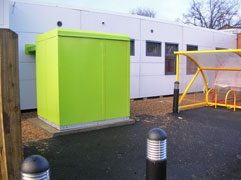Clean Heating
Heat Pumps
Heat pumps, together with solar thermal panels, are the only renewable technologies supported by the Renewable Heat Incentive which issue no CO2 on site: they do not rely on combustion.
Advantages of Heat Pumps
Heat pumps save money. Heat pumps are cheaper to run than direct electric heating. They are cheaper to run than oil boilers and can be cheaper than running gas boilers. Because heat pumps can be fully automated they demand much less work than biomass boilers.
Heat pumps save carbon emissions. Unlike burning oil, gas, LPG or biomass, a heat pump produces no carbon emissions on site (and no carbon emissions at all, if a renewable source of electricity is used to power them): clean heating. As the electric grid decarbonises the carbon emissions from using a heat pump falls each year.
Heat pumps save space. There are no fuel storage requirements.
Heat pumps are safe. There is no combustion involved and no emission of potentially dangerous gases. No flues are required.
Heat pumps require less maintenance than combustion based heating systems.
Heat pumps last longer than combustion based boilers.
Heat pumps can provide cooling in summer, as well as heating in winter.
When buildings are connected with a Heat Sharing Network – a cold water district circuit – rejected heat from buildings needing cooling can be recycled to heat buildings that need heating.
Advantages of Ground Source Heat Pumps
The key advantage of using a GSHP is that the coefficient of performance is higher than an ASHP in winter, because the temperature in the ground is higher than the ambient air temperature.
Another advantage of using a GSHP is that the coefficient of performance for cooling is much higher than for an ASHP in summer, because the temperature in the ground is lower than the summer air temperature.
Planning permission is also easier as a GSHP can be located out of sight and makes virtually no noise. As a GSHP has fewer moving parts and will normally be located inside the building it will enjoy a longer working life.
Dramatically lower carbon emissions from heat pumps
The carbon emissions of heating based on heat transfer are dramatically lower than any heating system based on combustion of carbon compounds. The current carbon emissions from different heating systems are shown by the Carbon Emissions Calculator.
Ground Source Heat Pumps and District Heating
Ground Source Heat Pumps are becoming the heat mechanism of choice for urban district energy schemes because they allow scalability of networks as well as being the cheapest to install, the cheapest to run and the only route to zero carbon emissions in cities.


